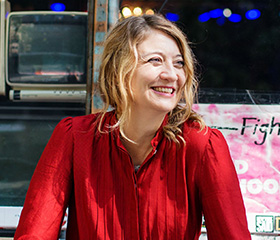A few minutes after I had completed my remote conversation with Heidi Schreck I realized that I’d failed to ask her anything about What the Constitution Means to Me – her 2017 work of practical civics that was not only a hit on Broadway but this past season became the most produced play by professional theaters in the United States.
Blame Chekhov. For those of us who love him there is something about this Russian writer that quickly crowds out all other subjects. For Schreck, whose new version of Uncle Vanya, directed by Lila Neugebauer, will soon begin previews on LCT’s Vivian Beaumont stage, the fascination with Chekhov and Russia has been going on for much of her life.
“I studied Russian at the University of Oregon then spent time in Russia, first as a teacher of English in Siberia then as a journalist in St. Petersburg,” Schreck said. “And when I returned to the states I worked for several years as translator for visiting Russian acting teachers and theater companies.”
To arrive at her version of Vanya Schreck first created a literal translation with Russian-language and Chekhov expert Tatyana Khaikin. “We spent hours together poring over every word. Tatyana worked for years at the Moscow Art Theater school so she knows and loves this play like it’s her own kid. I learned so much from her about Chekhov, about this play, about, well, life.”
“After that, I worked closely with Lila to create a version of the play that felt contemporary and immediate, like it could be happening right now,” Schreck said. “Or maybe some time in the near future.” She added: “This was delicate work that involved pruning 19th-century and Russian signifiers – patronymics, horse carriages, untranslatable idioms, samovars, and also making sense of things like ‘What kind of rural doctor would Astrov be today?’ and ‘Who is this man in a contemporary context?’”
But why do this story in 2024? “Lila and I each read the four major Chekhov plays after this project arose and we were in immediate agreement that this was the one that seems urgent.” Partly, Schreck said, Uncle Vanya felt right “after the COVID exhaustion of the past four years.” And partly, she continued, “it spoke to where I am in my life. I’m 52, so it makes sense to ask the question: what am I – what are we – doing with our time?” In her twenties, she went on, she translated and performed in a version of The Seagull with the director Kip Fagan, now her husband. “That was the right play for me as a young person,” Schreck said. “Uncle Vanya resonates with middle-aged me.”
Although Schreck and Khaikin worked from the original Russian text, Schreck is very familiar with other translations of Vanya, including the recent ones by Annie Baker and Richard Nelson. “I can’t pretend those wonderful translations have not shaped my understanding of this play, or further stoked my love for it,” Schreck explained. She also has high regard for the 1990s version by Paul Schmidt, and praise for the David Mamet version that was used for the 1994 movie Vanya on 42nd Street, directed by Louis Malle, written by Andre Gregory, and starring Wallace Shawn, Brooke Smith, and Julianne Moore. “I’ve seen that movie so many times,” Schreck said. “It feels so contemporary and downtown but also deeply true to the original.”
Schreck wants her version to stay true to Chekhov, too. “I was talking about the work of translation with Amy Herzog” -- the respected playwright, whose “Enemy of the People” adaptation is currently on Broadway – “and she remarked that it’s important to somehow preserve the strangeness that lives in the original. If you don’t there’s a danger you’ll also lose the soul of the work.”
That balance between Uncle Vanya’s hopelessness and its humor was also crucial for Schreck. “I’ve been listening so carefully for that during rehearsals,” she said. “And I will continue to change little things once we start previews and can hear how the audience is responding.” She added: “It’s a gift to have a terrific cast like ours – performers with beautiful souls who know how to navigate the comic tragedy of being human.”
Brendan Lemon is a freelance journalist in New York.
